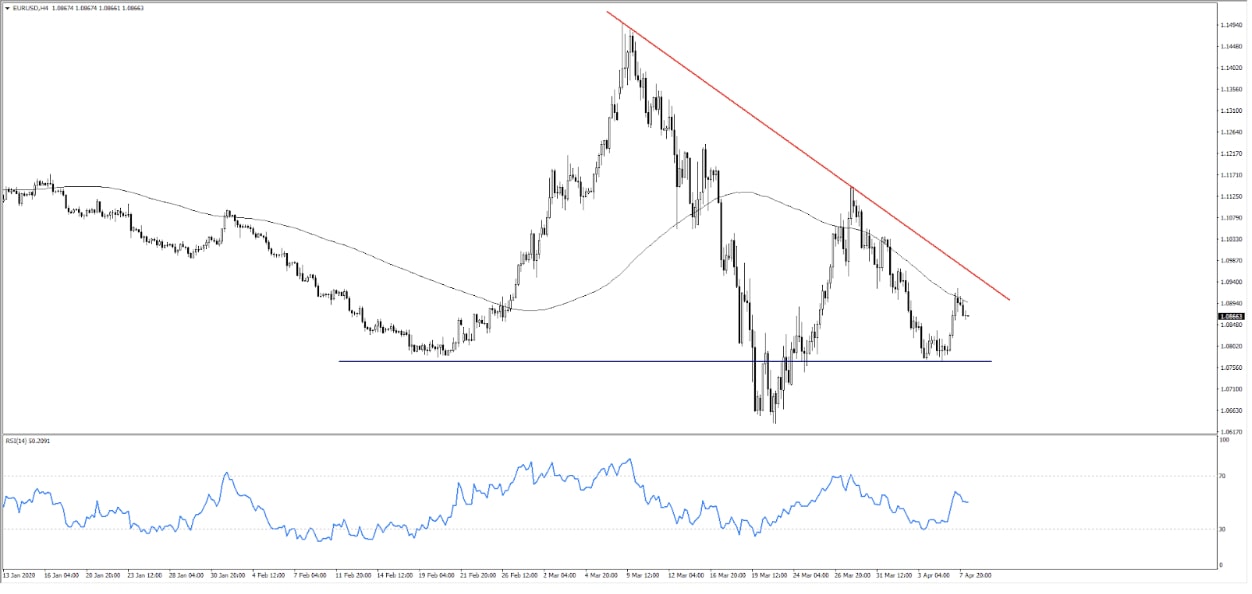The ECB accepted junk-rated Greek sovereign debt as collateral in Eurosystem credit operations, facilitating the country’s funding to fight the coronavirus. The package also includes easier conditions for the use of additional credit claims, and a general reduction of collateral valuation haircuts. These new measures are set to provide relief to the banks that have been struggling to raise funds, mitigating the tightening of financial conditions across the euro area.
EUR has experienced a six-day losing streak since March 30 because of the high infection rate and record low PMIs. The rally on Tuesday was impressive but failed to close above 1.09, a key resistance level.
The EU finance ministers remained deeply divided on the ‘coronabonds’, a joint bond that pools borrowing among EU nations to fight the crisis and shows solidarity. The rich nations, including Germany and Netherland, prefer to stick to existing financial relief facilities, which have been criticised by other members including Italy, France and Spain.
The lack of joint fiscal measures in the euro area remains a weight on its currency. The excess Eurozone liquidity and the dollar strength amid the virus-driven uncertainty are also the headwinds for EUR for a certain period of time.
4-hour chart EURUSD

"4-hour chart EURUSD"
The set-up looks bearish on the 4-hour chart. The uptrend is clearly capped by the 100 SMA and descending trendline (red) since March 9. A break above the 100 SMA near 1.09 will trigger the bullish bias toward 1.10. But until then, I’d expect it would head toward 1.0835, and then retest February and April low near 1.0769 (blue line).
In case you are interested, the latest package mentioned above is complementary to other measures recently announced by the ECB, which include:
- A temporary additional net asset purchases Programme (APP) of €120 billion
- Additional longer-term refinancing operations (LTROs) to provide immediate liquidity support to banks until June
- Targeted longer-term refinancing operations (TLTRO III) with lower rate
- Pandemic Emergency Purchase Programme (PEPP) with €750 billion and the size is available to increase if necessary
- To expand the range of eligible assets under the corporate sector purchase programme (CSPP) to non-financial commercial paper
- To expand the scope of Additional Credit Claims (ACC)
Ready to trade?
It's quick and easy to get started. Apply in minutes with our simple application process.
The material provided here has not been prepared in accordance with legal requirements designed to promote the independence of investment research and as such is considered to be a marketing communication. Whilst it is not subject to any prohibition on dealing ahead of the dissemination of investment research we will not seek to take any advantage before providing it to our clients.
Pepperstone doesn’t represent that the material provided here is accurate, current or complete, and therefore shouldn’t be relied upon as such. The information, whether from a third party or not, isn’t to be considered as a recommendation; or an offer to buy or sell; or the solicitation of an offer to buy or sell any security, financial product or instrument; or to participate in any particular trading strategy. It does not take into account readers’ financial situation or investment objectives. We advise any readers of this content to seek their own advice. Without the approval of Pepperstone, reproduction or redistribution of this information isn’t permitted.
